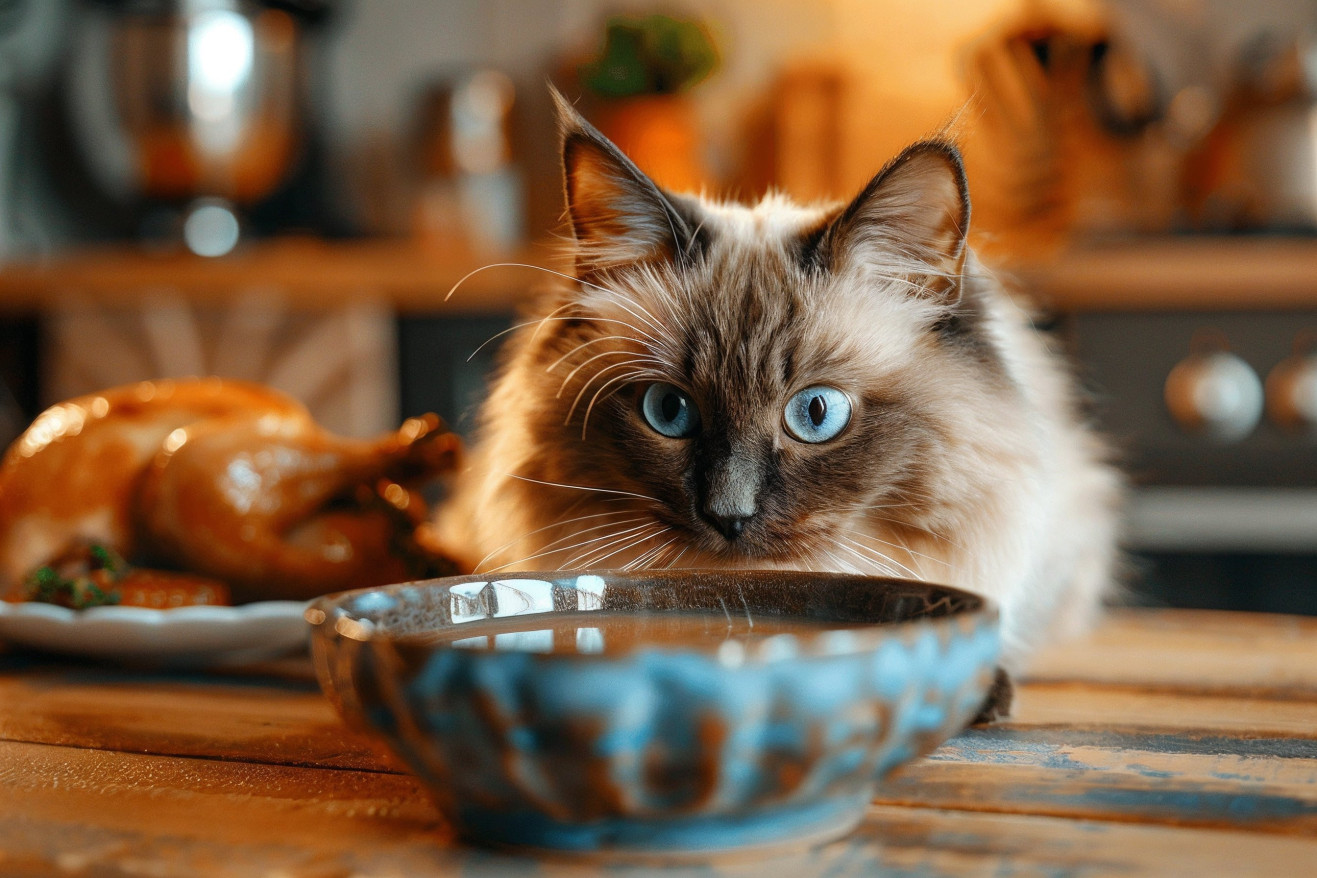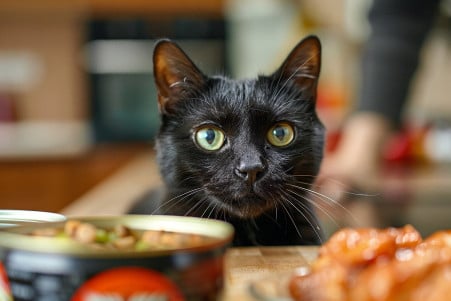Is Chicken Broth Good for Cats? The Science-Backed Guide to Feline Nutrition
6 March 2024 • Updated 6 March 2024

The search for healthy cat snacks never ends, but could chicken broth be the answer to your cat’s dietary needs? It turns out that cats can have chicken broth, and it can help with hydration, digestion, and even immunity and joint support.
That said, it’s important to make sure you’re making it at home to ensure that it doesn’t contain any harmful additives like onions or too much salt, and to always check with your vet before adding anything new to your cat’s diet.
This article will go over what we know from vets and nutritionists about the role of chicken broth in a cat’s diet. We’ll cover a variety of research that spans the fields of animal nutrition and veterinary medicine to help you understand the potential benefits and risks of giving your cat chicken broth.
This will help you better understand how this unassuming liquid can impact your cat’s health, so you can make the best nutritional choices for your cat.
Is chicken broth good for cats?
The Liquid Lifeline: How Hydration Helps Your Cat’s Kidneys
Cats, whose bodies are made up of about 66% water, are a prime example of how important hydration is to overall health, especially when it comes to kidney health.
As Hill’s Pet explains, one of the main reasons cats need to make sure they’re getting enough water is to avoid dehydration, which can lead to health issues like kidney disease and urinary tract disorders. By including chicken broth in their hydration routine, you can help cats make sure they’re getting the water they need, even when they’re not drinking it on their own.
Dehydration can have serious consequences, from mild symptoms like lethargy and dry mouth to more serious issues like kidney disease. As VCA Animal Hospitals points out, cats with chronic kidney disease (CKD) need to make sure they’re staying hydrated to help manage their condition. By increasing the amount of water they consume through broths or wet foods, cats can help their kidneys out by diluting the waste products that build up in their blood.
To make sure you’re giving your cat chicken broth safely, make sure you’re giving them unsalted, onion-free homemade broth. You can mix it in with their regular meals or give it to them on its own to make sure they’re getting the benefits of variety and increased fluid intake.
Making sure your cat stays properly hydrated is an easy but important step in making sure they live a long and healthy life, and it also brings us to another important question: What other nutritional benefits can chicken broth offer your cat?
How to Follow the Nutritional Commandments of Obligate Carnivores: Chicken Broth in a Cat’s Diet
As obligate carnivores, cats need a diet that is high in animal-based proteins and other essential nutrients. According to the Cornell University College of Veterinary Medicine, a cat’s diet should be high in protein, moderate in fat, and low in carbohydrates.
Cats also need a variety of other nutrients, including vitamins, minerals, fatty acids, and amino acids, which add up to more than a dozen in total. Because chicken broth is high in certain amino acids, it can be a nutritious way to help ensure that cats get the variety of nutrients they need in addition to their regular diet.
That said, while adding chicken broth to a cat’s diet can help increase hydration and the intake of certain nutrients, it’s important to do so in moderation. Too much protein can be harmful, especially for cats with certain health issues, so it’s important to use chicken broth as a supplement to a cat’s diet rather than a primary source of nutrition.
In other words, think of it as a treat that can help ensure your cat gets the nutrients they need in addition to their regular food.
To make sure that you add chicken broth to your cat’s diet safely, make sure that you only use unsalted chicken broth that doesn’t contain any harmful additives and that you only use it in moderation in combination with a complete and balanced commercial cat food that meets the AAFCO standards.
If you do this, chicken broth can be a great way to help ensure that your cat gets the nutrients they need in addition to their regular diet, especially if they have food allergies.
Dealing With the Issue of Feline Food Allergies to Chicken Broth
According to the Cornell Feline Health Center, food allergies in cats are most commonly associated with skin and gastrointestinal problems. Although chicken broth is not one of the most common allergens, cats can be sensitive to new foods, so it’s important to introduce chicken broth carefully.
According to VCA Animal Hospitals, the most common allergens in cat food are beef, fish, chicken, and dairy, and the best way to deal with food allergies is to use an elimination diet.
An elimination diet consists of feeding the cat a novel, limited-ingredient diet that does not include the proteins that the cat has been exposed to in the past. By doing this, and feeding the cat a simple chicken broth, cat owners can see if their cat’s symptoms improve.
A study in PubMed recommends that these kinds of trials are important to get an accurate diagnosis and that if a food allergy is suspected, the foods should be reintroduced one at a time to see which one is causing the problem.
It’s important for cat owners to work with their veterinarian when it comes to giving their cat chicken broth if they suspect their cat has a food allergy.
A vet can make sure that the broth is free of the most common allergens and that it’s appropriate for the elimination diet. They can also help cat owners through the process.
By making sure that they avoid the foods that their cats are allergic to and monitoring their cats for any signs of a reaction, cat owners can make sure that they’re feeding their cats in a way that keeps them healthy and happy.
Making the Best Broth: Homemade vs. Commercial
The difference between homemade and store-bought chicken broth for your cat is important. As noted by CatTime, homemade chicken broth that doesn’t include spices or salt is not only safer, but it also has more health benefits. On the other hand, store-bought broths are often full of additives and spices that can be dangerous for cats. These can include too much sodium, onion, and garlic, all of which are toxic to cats.
The advantages of homemade broth are many. As shown in a study from PubMed, homemade diets, including broths, give you complete control over the ingredients, which means you can make sure no dangerous additives are included. This is important because a study from UC Davis shows that even small amounts of ingredients in recipes can lead to nutrient deficiencies or even the inclusion of potentially toxic substances for cats.
By making a chicken broth that’s safe for cats, which involves simmering chicken and bones in water without any spices, and then letting it cool, you can create a broth that will help hydrate and feed your cat, while also giving them a tasty treat. This way, cat owners can make sure their pet’s nutrition is tailored to their specific needs and avoid the dangers of store-bought products.
Whiskers and Wellness: The Final Chapter of Chicken Broth
As we’ve made our way through the many culinary uses of chicken broth for cats, we’ve come to understand it as both a treat and a remedy. We’ve learned how it can be used to encourage picky cats to drink more water, which is important for kidney health.
We’ve also learned that homemade chicken broth can be a healthy supplement that offers the nutrients cats need based on their carnivorous diets and without the harmful ingredients found in many store-bought broths.
We’ve also learned about the importance of being aware of food allergies and the role of a veterinarian in helping to monitor and manage them. We’ve learned that chicken broth can be used as part of an elimination diet to help pet parents figure out what their cats are allergic to so they can eat without discomfort.
Homemade chicken broth is a symbol of safety and health, and its simplicity and purity can give pet parents peace of mind. When used under the guidance of a veterinarian, pet parents can ensure that they’re using chicken broth in a way that’s in line with their cat’s unique health needs, and that every sip is a step toward wellness.
As we wrap up, let’s remember that the knowledge that we can make informed decisions about what we feed our cats to help them live long, healthy lives.


